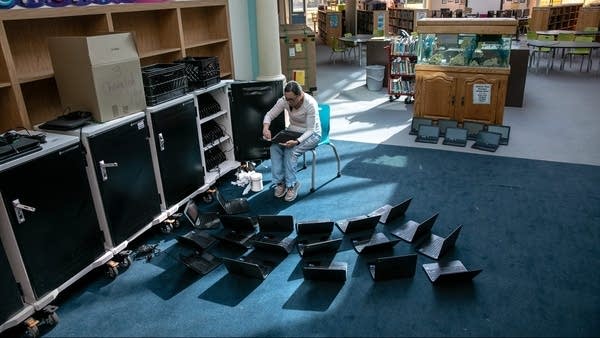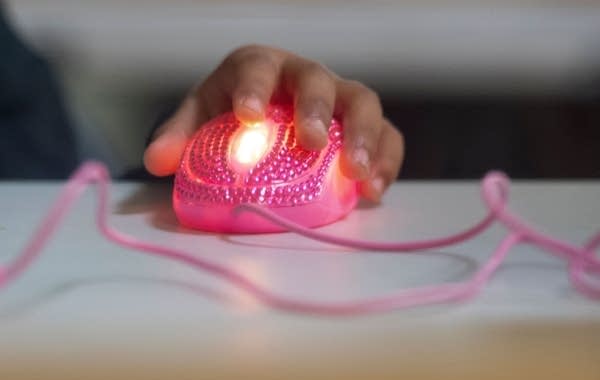The promise of the technology is that AI can monitor students’ progress and modify lessons on the fly.

Every Monday this fall, we’re taking a look at how schools are using technology during the pandemic. And for some, it’s an opportunity to make changes to teaching that have been in the works for a long time. Specifically, personalized learning — the idea that kids all learn at different paces and in different ways, and that curriculums can be tailored to a child’s learning style using artificial intelligence to monitor their progress and modify lessons on the fly.
I spoke with Sheldon H. Jacobson, a professor of computer science at the University of Illinois at Urbana-Champaign. He said it’s a good time for an experiment, but we don’t know for sure if it works. The following is an edited transcript of our conversation.

Sheldon H. Jacobson: What students are doing is they are given an individualized curriculum. And by having that individualized curriculum, based on how they learn, the level that they’re at, as well as how they will progress, it enables the students to work at their own pace, advancing with the appropriate feedback. They’re in a situation [where] they’re maximizing the retention of knowledge and learning. So this is a great idea in many ways, and COVID-19 is accelerating it and making it possible. This is an idea that, in fact, has its time, and the time is now.
Molly Wood: You know, we’ve talked for years, decades, about attempting to personalize education, and it sort of seems like one of those problems that doesn’t scale easily. It’s hard for one teacher to manage an individualized curriculum for 28 students. How do these programs make it scalable?
Jacobson: Well, what they use are expert systems, artificial intelligence, to understand where the student is in the process. And by moving them forward in this process, it enables them to, in fact, keep at a pace that is commensurate with their retention of the information. So a teacher now has to, in some sense, manage multiple students simultaneously. But the software, the artificial intelligence, the algorithms, help facilitate that so it’s a much more smooth delivery.
Wood: Are there disadvantages? I mean, we’re also putting a lot of faith in AI to track progress, which, you know, can have its downsides, I would imagine.
Jacobson: One of the big downsides, as I see it, is that when you look at the fact that in a more traditional education setting, all the students are basically in front of an instructor, a teacher, and listening, and they’re all absorbing in their own way, but from a very single point of view. Now it’s going to be individualized. One of the disadvantages I see is that potentially students who are given, in some sense, the education product in their own individualized way, they may, in fact, not be able to adapt after they’ve graduated and have jobs, since they’ve been, in some sense, given an optimal learning process, they may not be able to adapt to other processes as easily. It’s not clear how that’s going to impact their life learning process, because education is all about learning how to learn for the rest of your life.
Wood: What does the uptake look like for schools who have struggled to implement, in some cases, even Zoom?
Jacobson: Well, one of the big questions, of course, is connectivity, because if the students are remote, do they have the necessary bandwidth and connectivity to be able to engage in this kind of program? What we don’t want to do is use programs like this so that the students who are already doing well do even better, which is good, but we’d want the gap in some sense to close, and it’s not clear if the individualized, personalized education process will close the gap or simply move everybody forward, upwards. And I’m not sure we know yet. And I’m talking about the achievement gap. The technology will help move everybody forward, but it’s not clear if it will actually close the gap of education and accomplishment. That’s what we’re really trying to do here — bring everybody up, but bring them all up to hopefully a much higher level.
Wood: In some ways, it seems like education has been pretty frozen, and COVID-19 is pushing districts and teachers and students and parents in all kinds of directions. In some ways, there’s a part of me that thinks maybe this is not such a great time to experiment. And yet, it also could be. I just wonder where you fall on that. What should we be taking advantage of right now?
Jacobson: Well, every crisis is an opportunity. And unfortunately, quite often the opportunities present themselves when we are under a crisis, under strain, and COVID-19 is creating that situation for us. The question is, what would have been the impetus to do this massive change in educational thinking without a crisis like COVID-19? And quite often people get comfortable in the way they do things. I like to say that education changes over a glacial timescale, because it takes generations of teachers and instructors to embrace a new idea. And this doesn’t happen overnight, obviously. It requires time and people to be educated and thought in a different way when they’re, in fact, delivering education.
Wood: It’s so funny, it sounds like you’re describing what teachers would have been able to do if they only had 10 kids.
Jacobson: That’s why it’s personalized. It’s much more focused around a smaller group; in some sense, a group of one, and that’s a great education process. To individualize a teacher to an individual student is very difficult, but with the software and artificial intelligence, you can facilitate that, and that’s where we’re heading. And the thing to remember, this is just the beginning. This is not the end-product yet [and] there will be more organizations and companies who will invest in this kind of idea and technology, and it will eventually grow. We don’t know the full ramifications and benefits that it will accrue over time.

There are a couple of programs that use AI-driven personalized learning for math, specifically like Teach to One 360 from a nonprofit called New Classrooms, Illustrative Mathematics and Eureka Math.
There’s a good piece in the New York Times about some of these companies, specifically Teach to One, which, notably, has raised money from various tech industry foundations — the Bill & Melinda Gates Foundation, the Michael & Susan Dell Foundation and the Bezos Family Foundation. That makes this a good time to note that Gates, Mark Zuckerberg and other technologists have long been proponents of personalized learning and more technology in classrooms. And, like professor Jacobson told us, there actually isn’t a lot of data to prove incontrovertibly that these approaches work or that they work better than engaged, high-quality teachers who get paid enough money and don’t have to buy their own books and pencils. Maybe those teachers could even have time at school to build relationships with kids that let them figure out who’s doing well and who isn’t!
And this is our last official Monday covering tech and education in the pandemic. Next week, we’ll turn our attention to elections and what it all might mean for tech business and policy. But we still want to hear your stories. My kid certainly isn’t going back to school anytime soon. Email us at mptech@marketplace.org and let us know how remote or in-person schooling is going, what tech challenges you have, what changes you might want to keep. As always, hang in there, parents. You’re doing great.